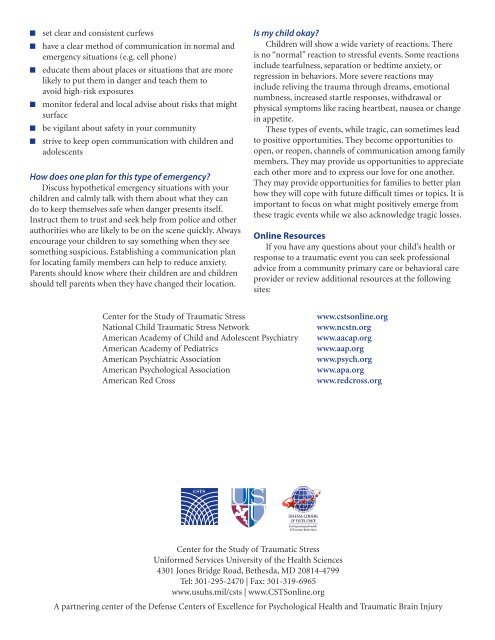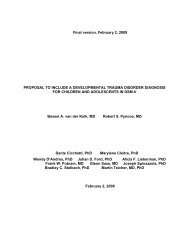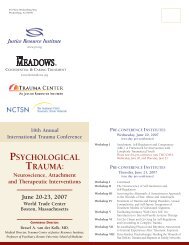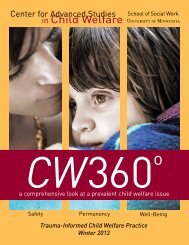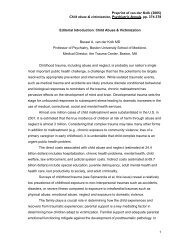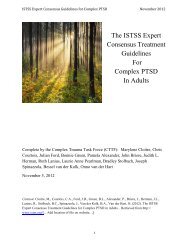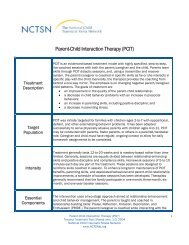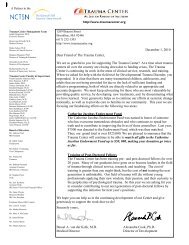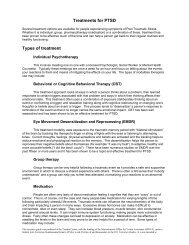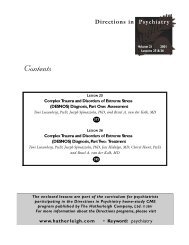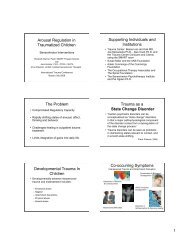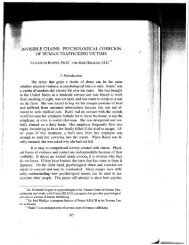Restoring a Sense of Safety - Center for the Study of Traumatic Stress
Restoring a Sense of Safety - Center for the Study of Traumatic Stress
Restoring a Sense of Safety - Center for the Study of Traumatic Stress
You also want an ePaper? Increase the reach of your titles
YUMPU automatically turns print PDFs into web optimized ePapers that Google loves.
■■<br />
■■<br />
■■<br />
■■<br />
■■<br />
■■<br />
set clear and consistent curfews<br />
have a clear method <strong>of</strong> communication in normal and<br />
emergency situations (e.g. cell phone)<br />
educate <strong>the</strong>m about places or situations that are more<br />
likely to put <strong>the</strong>m in danger and teach <strong>the</strong>m to<br />
avoid high-risk exposures<br />
monitor federal and local advise about risks that might<br />
surface<br />
be vigilant about safety in your community<br />
strive to keep open communication with children and<br />
adolescents<br />
How does one plan <strong>for</strong> this type <strong>of</strong> emergency<br />
Discuss hypo<strong>the</strong>tical emergency situations with your<br />
children and calmly talk with <strong>the</strong>m about what <strong>the</strong>y can<br />
do to keep <strong>the</strong>mselves safe when danger presents itself.<br />
Instruct <strong>the</strong>m to trust and seek help from police and o<strong>the</strong>r<br />
authorities who are likely to be on <strong>the</strong> scene quickly. Always<br />
encourage your children to say something when <strong>the</strong>y see<br />
something suspicious. Establishing a communication plan<br />
<strong>for</strong> locating family members can help to reduce anxiety.<br />
Parents should know where <strong>the</strong>ir children are and children<br />
should tell parents when <strong>the</strong>y have changed <strong>the</strong>ir location.<br />
Is my child okay<br />
Children will show a wide variety <strong>of</strong> reactions. There<br />
is no “normal” reaction to stressful events. Some reactions<br />
include tearfulness, separation or bedtime anxiety, or<br />
regression in behaviors. More severe reactions may<br />
include reliving <strong>the</strong> trauma through dreams, emotional<br />
numbness, increased startle responses, withdrawal or<br />
physical symptoms like racing heartbeat, nausea or change<br />
in appetite.<br />
These types <strong>of</strong> events, while tragic, can sometimes lead<br />
to positive opportunities. They become opportunities to<br />
open, or reopen, channels <strong>of</strong> communication among family<br />
members. They may provide us opportunities to appreciate<br />
each o<strong>the</strong>r more and to express our love <strong>for</strong> one ano<strong>the</strong>r.<br />
They may provide opportunities <strong>for</strong> families to better plan<br />
how <strong>the</strong>y will cope with future difficult times or topics. It is<br />
important to focus on what might positively emerge from<br />
<strong>the</strong>se tragic events while we also acknowledge tragic losses.<br />
Online Resources<br />
If you have any questions about your child’s health or<br />
response to a traumatic event you can seek pr<strong>of</strong>essional<br />
advice from a community primary care or behavioral care<br />
provider or review additional resources at <strong>the</strong> following<br />
sites:<br />
<strong>Center</strong> <strong>for</strong> <strong>the</strong> <strong>Study</strong> <strong>of</strong> <strong>Traumatic</strong> <strong>Stress</strong><br />
National Child <strong>Traumatic</strong> <strong>Stress</strong> Network<br />
American Academy <strong>of</strong> Child and Adolescent Psychiatry<br />
American Academy <strong>of</strong> Pediatrics<br />
American Psychiatric Association<br />
American Psychological Association<br />
American Red Cross<br />
www.cstsonline.org<br />
www.ncstn.org<br />
www.aacap.org<br />
www.aap.org<br />
www.psych.org<br />
www.apa.org<br />
www.redcross.org<br />
<strong>Center</strong> <strong>for</strong> <strong>the</strong> <strong>Study</strong> <strong>of</strong> <strong>Traumatic</strong> <strong>Stress</strong><br />
Uni<strong>for</strong>med Services University <strong>of</strong> <strong>the</strong> Health Sciences<br />
4301 Jones Bridge Road, Be<strong>the</strong>sda, MD 20814-4799<br />
Tel: 301-295-2470 | Fax: 301-319-6965<br />
www.usuhs.mil/csts | www.CSTSonline.org<br />
A partnering center <strong>of</strong> <strong>the</strong> Defense <strong>Center</strong>s <strong>of</strong> Excellence <strong>for</strong> Psychological Health and <strong>Traumatic</strong> Brain Injury


